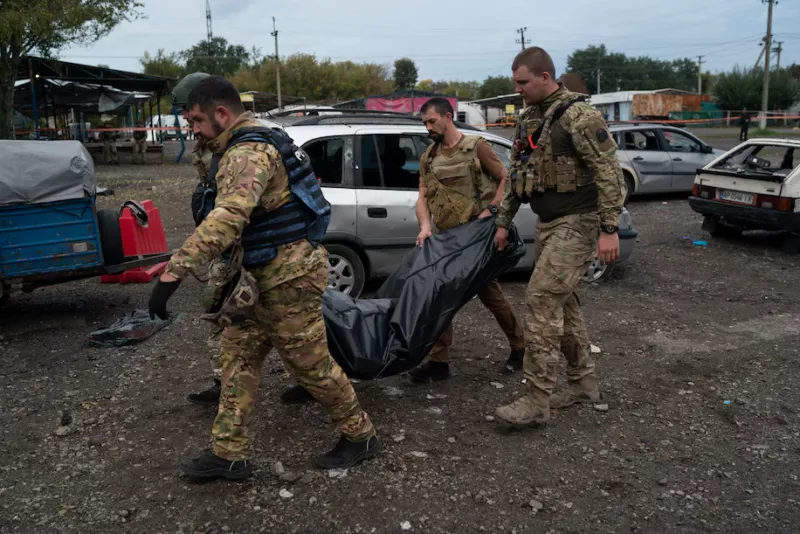
I can’t fault anyone who objects to the idea of a negotiated settlement of the Ukraine war. Russia started with an unprovoked invasion and moved quickly to war crimes. So why do I advocate negotiation if certain terms can be achieved?
Readers angered by my position equate a settlement with Russian President Vladimir Putin to British Prime Minister Neville Chamberlain’s 1938 Munich Agreement with Adolf Hitler. By this analogy, “appeasement” of Putin will only encourage him to invade more countries and seize more land, much as Hitler grabbed Poland in 1939, touching off World War II in Europe.
The comparison, once apt, is now past its shelf life. The right time to cite Chamberlain was in February, when the Russian tanks rolled. Good news: The lesson of Munich was emphatically learned. Far from appeasing Putin, the United States and its allies stoutly resisted, as Ukrainian President Volodymyr Zelensky stepped into the role of Winston Churchill.
Since then, Putin has been dealt a staggering defeat, from which Russia might never recover. The Ukraine invasion will go down in history as a nearly unparalleled blunder. Over seven months of an optional war have gutted the Russian military, sunk the Russian economy, weakened Russia’s partnership with China, alienated Russia’s trading partners, and touched off a stampede by Russia’s best and brightest to escape a dysfunctional country.
Putin’s attempt to snuff out Ukrainian independence has instead fortified and ennobled it. His effort to weaken NATO instead made NATO bigger and stronger than ever. Hitler’s Germany in 1938 was a rising power bristling with military and industrial might. Putin’s Russia is a broken nation in precipitous decline, leading the world in phishing, porn and not much else.
Russia’s decrepitude has been proved to the world so swiftly that comprehension lags behind. For generations, we’ve thought of Russia as a global power. Now we see that the cream of the Russian army can’t advance more than a few kilometers into a neighboring country without losing thousands of tanks, legions of soldiers and numerous generals.
But having seen it, the world won’t forget it. Russia’s days as an aggressor are over.
Critics of a negotiated peace worry about Putin “rebuilding” his aggressive capacity. How can he rebuild if he can’t build in the first place? His army can’t advance into Ukraine, his air force can’t fly over it, and his navy is rightly scared to approach shore. This, after Putin’s much-touted military buildup.
A nation that cannot build an effective military when the proceeds of fuel sales are sluicing in is no threat to “rebuild” when its economy is puny. Remember: Ukraine, an inspiring but subordinate power, wiped out the premier tank division of a Russian army supposedly built on tanks.
And where would Putin’s imaginary force find its generals? What promising young Russian would waste a career on such a feckless, corrupt force — to be known only for indiscriminate bombing, war crimes and incompetence?
The question we face (urgent and dangerous) is: How many more people must die before the fact of Russia’s defeat seeps through the informational dead zone of the Kremlin? Is it wise to accelerate that seepage? The case for negotiation is that a deal might create space for Russia to deflate rather than explode.
I share the moral outrage at Putin’s unprovoked invasion. I appreciate the visceral wish to see this war continue until even Crimea and Donbas — territory the West did not think worth fighting over before February — are under Ukrainian control. I understand the calls for regime change in Moscow.
But when folks tell me to remember 1938, I urge them to remember 2003. Saddam Hussein was a murderous, kleptocratic war criminal, just like Putin. He boasted of his giant army, just like Putin. And when he was toppled precipitously? We reaped a whirlwind of chaos. A similar chaos in nuclear-armed Russia is too dangerous to risk — if it can be avoided.
Moreover, just as the world could not tolerate Putin in Kyiv, neither can it tolerate mayhem among nuclear powers.
Critics warn against giving Putin room to “rebuild” his capacity. What capacity? We’ve seen the fruits of more than a decade of military buildup, funded by Europe’s thirst for Russian gas. You can’t rebuild what never was.
Vast in resources, deep in culture, Russia is perpetually poor when it comes to government. Nothing better than Putin appears to be waiting in the wings. So I reluctantly support a negotiated settlement, with lines limited to the pre-February status quo, if we can get that deal, to give time for the next step to emerge. It is the safest way out: for Ukrainians, for Russians and for the rest of us.
David Von Drehle writes a twice-weekly column for The Post. He was previously an editor-at-large for Time Magazine, and is the author of four books, including "Rise to Greatness: Abraham Lincoln and America’s Most Perilous Year" and "Triangle: The Fire That Changed America".
